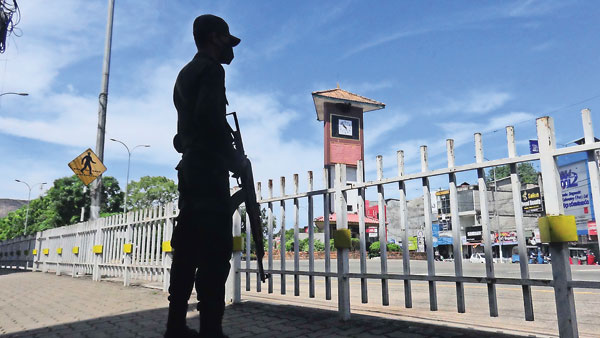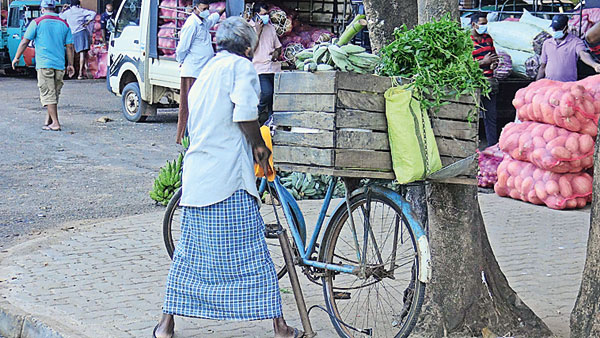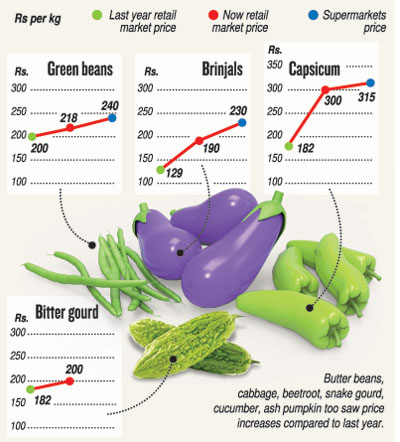News
Vegetable prices spike after farmers turned away from Dambulla Economic Centre

A security personel stands guard at the economic centre. Pix by Kanchana Kumara
An increase in vegetable prices is predicted in the coming weeks as the country’s largest economic centre continues to be closed amidst growing concerns of COVID-19 spreading in public markets and economic centres.
Farmers and traders allege the Government’s inability to take immediate remedial measures will result in both farmers and consumers facing losses, shortages and price increases.
“Seventy percent of the country’s vegetable trading takes place at the Dambulla Economic Centre. The Government should immediately purchase the vegetable stocks and have a mechanism to distribute the produce to markets. We are ready to assist the Government if it comes up with the plan to purchase vegetables from farmers who are left helpless due to the closure of the economic centre,” said All Ceylon Farmers Federation’s Convener Namal Karunaratne.
He said the Government decided to close economic centres but it did not come up with any plans to support the farmers who have harvested their produce yet have no way of selling their vegetables.

Earlier in the week the Matale District COVID prevention committee decided to open the Dambulla Economic Centre only to farmers from the Matale district. However, later in the week the economic centre was declared closed for a period of two weeks due to the pandemic situation.
The Head of the COVID committee Major General Nishantha Manage said PCR tests revealed there were many COVID-infected people within the Economic Centre. He said this posed a threat to the entire Matale district.
There was a chaotic situation at the Dambulla Economic Centre over the past few days as farmers with their lorries full of vegetables arrived at the economic centre and were then told to leave. Some of them sold their produce to middlemen at bargain prices, and others went back to their villages.
Shasheendra Rajapaksa, State Minister of Paddy and Cereals, Organic Food, Vegetables, Fruits, Chilies, Onions and Potatoes, Seed Production and High Tech Agriculture, said even though both traders and farmers wanted the economic centre to continue operations, health authorities wanted the centre to be closed for a period of two weeks.
“Most COVID positive patients revealed they travelled to the economic centre and there were cases within the economic centre as well. We have to follow health instructions,” he said.
He asked registered farmers to take their produce to other economic centres, and he told them not to sell their vegetables on the roadsides.
According to the activities permitted based on Alert Level III by the Health Services Director General, open markets/fairs and economic centres can be open only with a maximum of 25 percent of the total customers that can be accommodated within the premises.
However this week, Epidemiology Unit Chief Sudath Samaraweera said if economic centres failed to follow health and safety measures, a large number of people could end up contracting COVID. 
Moreover, compared to last year, almost all vegetables have increased in price.
Census and Statistics Department statistics recently revealed that green beans that were about Rs. 200 per kilo last year in the retail market, are now sold at Rs. 218. However, in supermarkets the price is Rs. 240 a kilo.
A kilo of brinjals that was Rs. 129 last year is now sold at Rs. 190, while it is Rs. 230 for a kilo in supermarkets.
A kilo of capsicums was Rs. 182 last year and at present they are sold at Rs. 300 a kilo.
Last year, bitter gourd was priced at Rs. 182 per kilo and is now sold at about Rs. 200 per kilo.
Butter beans, cabbage, beetroot, snake gourd, cucumber, ash pumpkin too have increased in price since last year.


